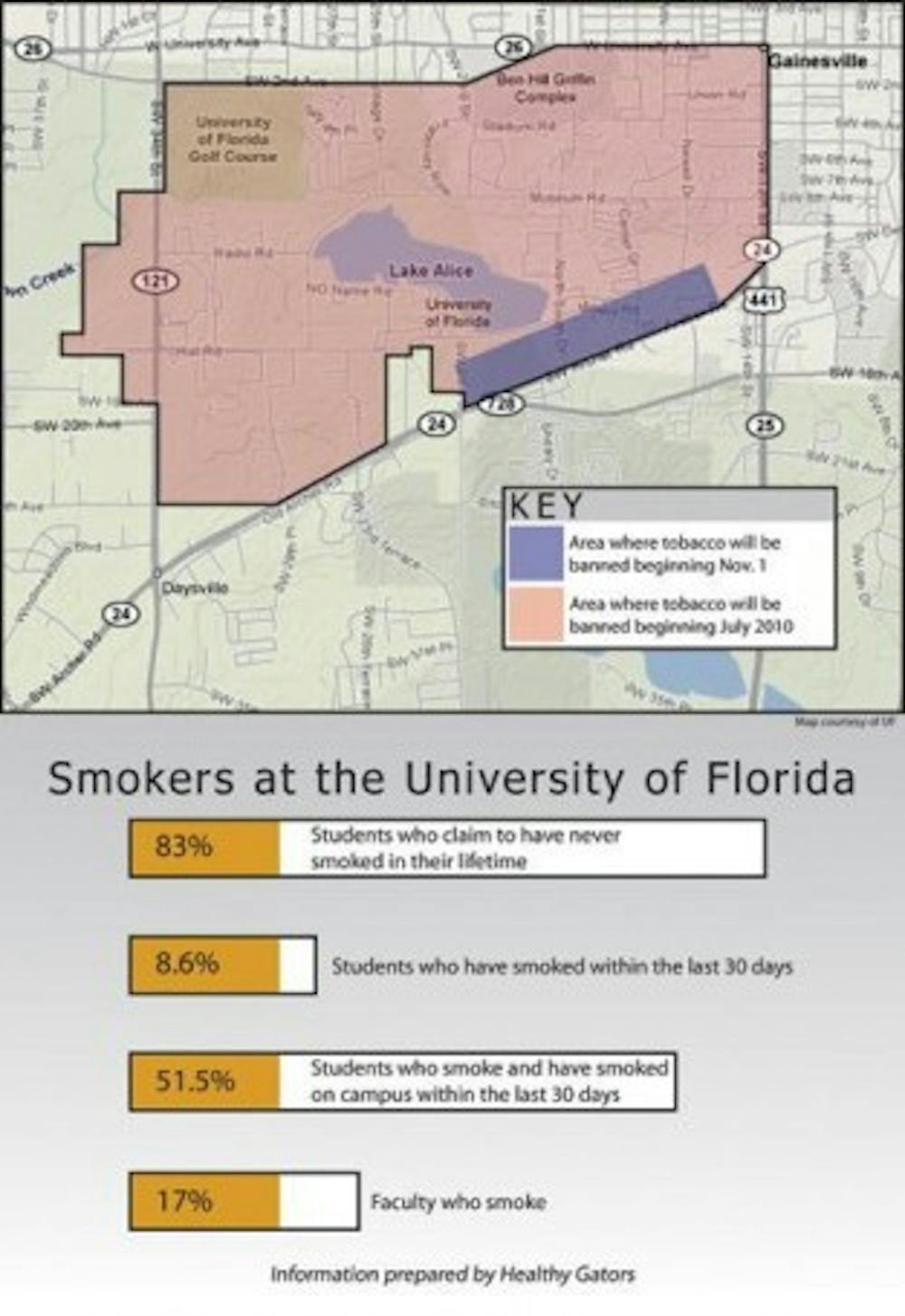In an effort to become healthier and cleaner, UF will ban tobacco on its main campus beginning in July, joining over 100 campuses across the U.S. that have already gone smoke free.
The campus-wide ban will include all types of tobacco.
Providing a preview of the new policy, UF's Health Science Center and all Shands HealthCare buildings will go tobacco free on Nov. 1.
The new policy was proposed by UF's Healthy Gators 2010 Coalition, an organization of students, faculty and staff.
UF President Bernie Machen approved the policy, and 64 percent of student voters approved it on spring ballots.
Enforcement of the tobacco ban will rely on building administrators and peer pressure to keep tobacco at bay, UF spokesman Steve Orlando said, the same way the current 50-foot rule is enforced.
"There's not gonna be officers handing out tickets," he said. "It's really going to be more word of mouth. Our hope is that everybody will realize it's the right thing to do."
Employees caught smoking on campus could face consequences from supervisors, he said, including negative comments in their evaluations.
Almost 9 percent of students reported smoking a cigarette in the last 30 days, according to a UF study from fall 2008, and it is estimated that about 17 percent of UF employees smoke.
According to Jill Varnes, UF professor of health education and behavior and vice chair of Healthy Gators, the ban aims to make UF students and employees healthier. She referenced a Healthy Gators report that says smokers miss more work and are less productive than non-smokers and spend less on health care.
Varnes said the new policy will also encourage smokers to quit, but she said UF is not telling people they can't smoke.
"What we're saying is, 'Not on our campus,'" she said.
According to the coalition's report, cigarette butts "are the single most common form of litter in the world." On the UF campus, about 50,000 cigarette butts are tossed on the ground within 50 feet of buildings each week, according to a study produced by Steve Pokorny, an assistant professor in UF's department of health education and behavior. That translates to about 2.6 million butts a year, Pokorny said.
While tobacco and cigarette papers are biodegradable, the filters are not, according to the report.
"It's definitely a critical health issue, but its also a sustainability issue," Varnes said.
UF is giving people plenty of notice before the ban takes effect to give them time to quit, she said. UF will also offer free stop-smoking classes and free or discounted medications for students and employees, though its not clear yet if UF will have the money to increase the number of classes and medications available.
Students who smoke more than 10 cigarettes a day are eligible for the Student Health Care Center's QUIT program, while employees are eligible for another program offered through the center that allows spouses to enroll for a $100 fee.
UF is also hoping that students and employees take advantage of other resources in the community and has provided a list at its new Web site, tobaccofree.health.ufl.edu.
Pokorny, the professor who counted the number of discarded cigarette butts on campus, said he doesn't think UF's ban will be effective.
"There has to be an enforcement component to change behavior," he said.
Taking into account the smaller campus size, he said Santa Fe College has about half as many discarded butts within 50 feet of its buildings, even though more of its students smoke.
Officers at Santa Fe can issue citations and have written 10 since April, according to the SFC police department. Cited students have to attend a two-hour educational workshop.
Other critics, like student Sen. Jonathan Ossip, say the ban attempts to regulate morality.
"It seems like the university administration is trying to make the campus into their perfect image," he said.
Another student senator, Alan Yanuck, said if UF can ban tobacco on campus, it can also decide to ban alcohol.
"It's a dangerous precedent to set," Yanuck said.
When asked if the Healthy Gators might recommend an alcohol ban, Varnes did not rule out the possibility but said the group would not focus on alcohol in the coming year.
She said the tobacco ban is similar to many other UF rules.
"We have all kinds of policies in place that regulate behavior on campus," she said.
Yanuck said he also took issue with the university's decision to ban all tobacco instead of stopping at smoking.
Bill Properzio, director of UF's Environmental Health and Safety Department, said although smokeless products, like chewing tobacco, do not harm the health of others, they still cause cancer to the user and can be a nuisance to others.
"People that are chewing tobacco are spitting it out on the sidewalks," he said. "It's a sanitary issue."
But if that's the issue, Yanuck argued, why not extend the ban to gum?
"I see people spit gum out on campus all the time," he said.






